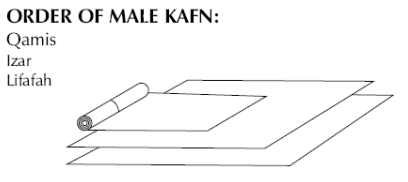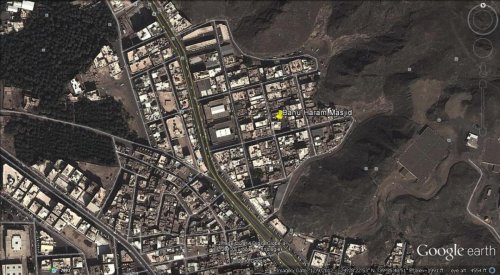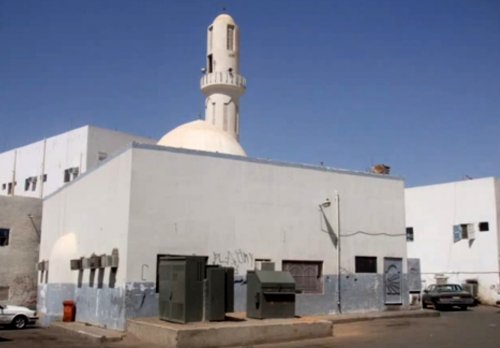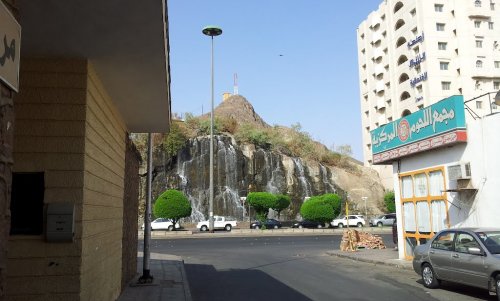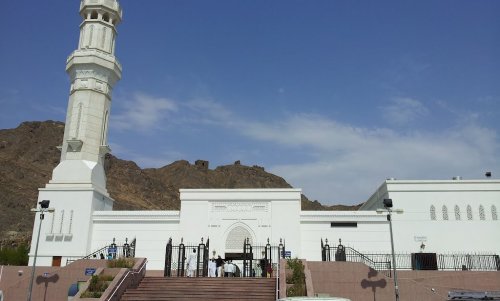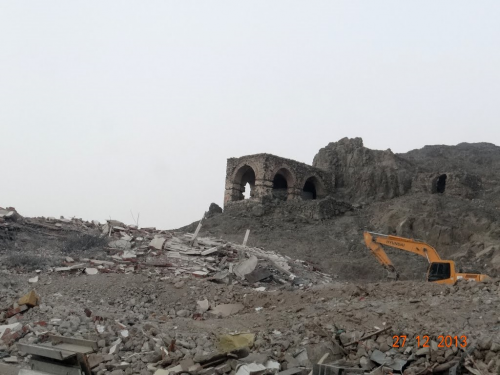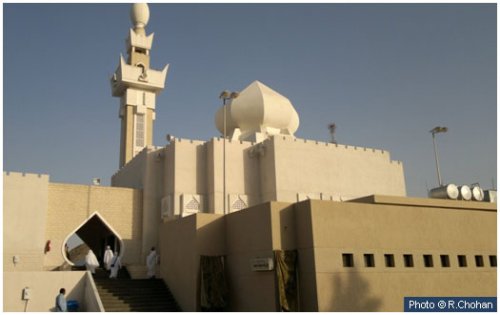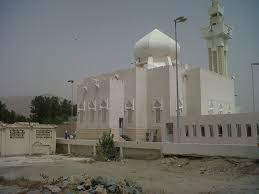-
Posts
8,462 -
Joined
-
Days Won
773
Content Type
Profiles
Forums
Events
Everything posted by ummtaalib
-
SHROUDING THE DECEASED The shrouds may be any of any type or colour usually worn by the deceased but preferably of nice quality and white cotton[51]. The shroud of both, men and women[52], should be perfumed with incense an odd number of times before the deceased is wrapped in them. It is preferable to burn incense at three times: when the soul is leaving the body, at the time of bathing the deceased, and when the deceased is shrouded[53]. The hair and the beard of the deceased should not be combed or braided and the nails should not be cut[54]. It is Sunnah that a man is shrouded in three clothes[55]: Izar – a loin cloth extending from the head to the feet like the Lifafah [56] Qamis – an upper garment extending from the shoulders to the feet Lifafah – (chador) a complete wrapper extending from the head to the feet It is also permissible to restrict the man`s shroud to only the Izar and Lifafah[57]. (Pictures from Muslim Funeral Services Ltd.) The deceased male should be put in the shrouds. Firstly, the Lifafah should be spread out and thereafter the Izar should be unfolded on top of it. The deceased should be wrapped in a Qamis without sleeves and put onto the Izar to be folded into it first from his left and then from his right and then similarly into the Lifafah[58]. The additional wrapper should be wrapped around the deceased beginning with the left side, putting the shroud over him, then the right side. The shroud may be fastened with a knot[59]. It is Sunnah that a woman[60] should be shrouded in five cloths: Izar Qamis Khimar – a scarf which should be on top of the Qamis under the Lifafah A cloth with which her bosom is tied Lifafah It is also permissible to restrict the woman`s shroud to only Izar, Khimar and Lifafah[61]. The deceased female should be put in the shrouds. Firstly, the Lifafah should be spread out, then the cloth to place on the bosom, then the Izar on top of it. The deceased should be wrapped in a Qamis and put onto the Izar to be folded into it, then the cloth and then into the Lifafah. The two hair plaits of a woman should be placed on her chest on top of the Qamīs. Then the woman should be made to cover the head and face wear the Khimar below the Lifafah and on top of the Qamis. Then she should be wrapped in an Izar. The peace of cloth should then be fastened on top of that behind the chest on the bossom and then the Lifafah should be fastened[62]. The child close to maturity will be shrouded with the same clothes as an adult. If the achild is younger, it is better to enshroud him also with the full kafn, although it is permissible to enshroud the young boy in a single cloth and the young girl in two clothes[63]. Once the deceased has been wrapped in the shrouds, it is compulsory upon the people to pray over the deceased[64].
-
BATHING THE DECEASED [22] WHO SHOULD BATHE THE DECEASED? It is unanimously agreed that it is Fardh Kifayah upon the living people to bathe the deceased[23]. It is desirable that the washer should be one who is the closest of the people to the deceased or a person of piety[24]. The woman is allowed to bathe and shroud her deceased husband; but the husband is not allowed to bathe his deceased wife[25]. The husband must not touch or bathe the deceased wife; however, he is permitted to see her[26]. If there is no one from the same gender to bathe the deceased, Tayammum will be performed on the deceased using a cloth[27]. A young child may be bathed either by a male or a female[28]. It is permissible to kiss the deceased[29] It is the responsibility of the man to arrange the shroud and the burial of his wife[30]. METHOD OF BATHING[31]. It is better for the washer to make the intention of bathing the deceased[32]. When the people decide to bathe the deceased, they should put him on a broad bench or a bier. The deceased may be layed in any direction suitable, even though the feet may be facing the qiblah[33]. The bench or platform should be perfumed[34] odd number of times by rotating the incense around the bier[35]. The clothes of the deceased should be removed and a cloth should be placed to cover the deceased`s area from the knees to the navel[36] while the rest of the body could be kept exposed. Perform Wudhu for the deceased without rinsing his mouth or nose[37]. However, the washer may use a thin cloth to clean and enter water in the mouth and the nose and wipe the teeth and lips[38]. Water should be poured over the deceased The water should be boiled with leaves of lotus tree or saltwort. However, if one does not possess any of them, even simply pure warm[39] water is sufficient. The head and beard should be washed with khitmī (marsh mallow plant) or any soap available[40]. Then he should be made to lie down on the left side and be washed with water and leaves of lotus tree until is seen that the water has reached that part which is adjacent to the bench. The deceased should then be made to lie down on the right side and should be washed with water and leaves of lotus tree until is seen that the water has reached that part which is adjacent to the bench. Then the deceased should be made to sit and lean against the washer and the stomach of the deceased should be wiped gently[41]. Any impurity emerging from the deceased should be washed but there is no need to repeat the Ghusl or Wudhu or to replace afterwards the shroud[42]. The deceased should then be turned to his left side again and washed to complete Sunnah of completing virtuous acts in threes[43]. The water should be poured over the deceased thrice each time his side is turned[44]. The body of the deceased should then be dried and wiped with a cloth[45]. Hanut or any other fragrance[46] should be placed on his head and beard and camphor on the forehead, the nose, the hands, the knees and the feet[47]. If after birth, the child shows a sign of life, including making noise, yawning, crying etc. it should be named, given a bath, shrouded and prayed upon[48]. However, a miscarried foetus and a child who does not show signs of life after birth, should be washed, wrapped in any cloth and buried without the funeral Salah being observed over it[49]. It is desirable for the washer to take a bath himself after bathing the deceased[50].
-
Mufti Hanif Yusuf Patel (hafidhahullah) has prepared this detailed document of janāzā, burial and related isues as part of his thesis for the Iftā course. The interesting part of the document is the practical guidance on Wills and Estates. I have read the document in detail. May Allah Ta`ālā grant Mufti Hanif Yusuf Patel barakah in his ilm. Amīn. Mufti Ebrahim Desai Daruliftaa.net :::: Laws relating to the deceased :::: BATHING * SALAT AL-JANAZAH * BURIAL * TA`ZIYAH * INHERITANCE & ESTATES * ISAL AL-THAWAB * WILLS & TESTAMENTS DEATH BEFORE DEATH The person on his deathbed should be turned to his right side facing the Qiblah[1]. It is also permissible to lie him on his back and to raise his head slightly to face the Qiblah[2]. The words of Shahadah should be proclaimed near him for him to hear[3] and thus indirectly prompt him to proclaim it too. This is called Talqin. However, he should not be instructed and compelled to recite it[4]. It is Mustahab (desirable) for the deceased`s close relatives, friends and neighbours to be present to advise him on his last will, assist him in encountering this critical moment and read Surah Yasin and Surah Ra`d onto him[5]. AFTER DEATH It is Fardh Kifayah to bathe, to enshroud, to observe the Janazah Salah of, and bury the deceased[6]. When he passes away, his eyes should be shut and jaws should be closed using a band fastened from the lower chin to the top of the head[7]. The one who has shared the most companionship with the deceased is most worthy of undertaking this task and he should say while closing the eyes[8]: بسم الله ، وعلى ملة رسول الله، اللهم يسِّر عليه أمرَه وسهِّل عليه ما بعده، وَأسعِده بلقائك، واجْعَلْ ما خرج إليه خيرًا مما خرج عنه Then the deceased should be covered with a sheet of cloth[9] and fragrance should be placed near him[10]. A piece of iron or anything reasonably heavy should be put on his stomach so that it does not inflate[11]. The hands of the deceased should be placed to his sides while his fingers and joints should be loosened[12]. It is Makrooh Tanzihi to recite the Qur`an by the deceased from his death until he is bathed[13]. It is Mustahab (highly desirable) to hasten in settling his debts and release him from his liabilities[14]. It is desirable to inform the deceased`s neighbours, relatives, friends and the people of the locality of his demise so that they can supplicate for him and extend reward for him[15]. The process of bathing and burying the deceased should be hastened[16]. Upon the demise of her husband, the woman should immediately sit in iddah. A woman in her iddah must remain in the marriage home for the complete duration of her iddah, without leaving the house, except for dire necessity[17]. The waiting period of iddah is for four months and ten days[18] (according to the lunar calendar). If the husband passed during the middle of the month, then the iddah will be 130 days.[19] Furthermore, if a woman is pregnant, her iddah will be till she gives birth to the baby irrespective of it being more or less than 4 months and 10 days[20]. The Qur`an should not be recited upon the deceased but at a distance from him or only after he has been bathed[21].
-

Evidence of Performing Missed Prayers
ummtaalib replied to ummtaalib's topic in Hanafi Fiqh (General)
i had posted a long explanation of my own feelings about this...unfortunately it seems to have been lost while the site was down ): will see later when more time -
Please see: Not Fasting Due To Illness
-
wa'alaykumus salaam sis I feel this reply needs more clarification.. found HERE and HERE Main point is that it is not “automatic” that every diabetic person is unable to fast. The person should only miss fasts if there is fear of the diabetes (or any illness) increasing or in the case of diabetes, there is fear of the person suffering a hypo. See below: Regarding illness, the great Hanafi jurist, Imam al-Haskafi (Allah have mercy on him) states in the chapter of “excuses that permit not to fast” in his excellent work Durr al-Mukhtar: “(It is permissible not to fast) for an individual who is ill and fears that his/her illness will increase, or a healthy person who fears that he will become ill due to fasting.” (Radd al-Muhtar ala al-Durr al-Mukhtar, 2/422)
- 1 reply
-
- 1
-

-

Evidence of Performing Missed Prayers
ummtaalib replied to ummtaalib's topic in Hanafi Fiqh (General)
The following Q/A is more of an advice regarding Qadhaa Salaah. Though there are no proofs in this reply by Mufti Ebrahim Desai i felt it is beneficial in this thread inshaAllah. Does qadah salah make up for the obligatory salah?Askimam.org Question Some people say that qadah salah does not really make up for obligatory salah, but you still have to do it? Is this true and to what extent? If qadah does not make up for missed salah, then what is the purpose of qadah? If you make up for all missed salah through qada, will you be saved for making up the salah on the day of judgement e.g. there will be no need to make up for missed salah through your nafil (optional) salah? Or will nafil salah still be needed to make up the obligatory salah? Answer Among the wisdom of performing Salaat, one is that Salaat is an Ibaadat (worship) of thanks giving to Allah Ta’ala for all His favours on us. Factually, if we spend every second of our lives to worship Allah, we will not be able to thank Allah for His infinite bounties upon us. Allah Ta’ala, out of His infinite grace has made it compulsory upon us to perform only 5 times a day. If we cannot even offer this little amount of time then we should hang our heads down in total shame. After enjoying all his bounties and this appreciation. Consider our situation, if we had to do someone a favour and he couldn’t find the time to say, ‘Jazaakallah’ how would we feel? Our Ibaadat does not increase Allah’s honour in any way. Allah Ta’ala is not in need of our Ibaadat. We are the beneficiaries of our Ibaadat. It is true that the Thawaab and virtue of a Salaat performed within its time is much more than the Qadhaa Salaats. However, that is no excuse for not performing Qadhaa Salaat. If a person sincerely repents for not performing Salaats timeously, it is hoped that Allah Ta’ala will accept the Qadhaa Salaat and forgive the sin of not performing the Salaat timeously. This hope obviously will come from one who is sincere in his regret. A true of sincerity is that he will ensure performing all his Salaat timeously. It is also advisable as part of your repentance to offer Nafl Salaat to make up for the shortfall in the Fardh as stated in a Hadith of Rasulullah (Sallallaahu Alayhi Wasallam), the meaning of which is, ‘The first act to be reckoned for on the day of Qiyaamat will be Salaat. If the Salaat is in order then this person is in ruin and destruction. And if there is a shortfall in his Fardh Allah Ta’ala shall say, ‘See if my servant has any Nafl (optional) Ibaadat to his record. Then the shortfall shall be completed with this Nafl, thereafter all other Ibaadat shall be accounted for accordingly.’ (Mishkaat vol.1 pg.117; Qadeemi) and Allah Ta’ala Knows Best Mufti Ebrahim Desai FATWA DEPT. -

Evidence of Performing Missed Prayers
ummtaalib replied to ummtaalib's topic in Hanafi Fiqh (General)
there is also some info here Mufti Abu Hajira says, Re: What is the proof of Kaza Namaz? -

Evidence of Performing Missed Prayers
ummtaalib replied to ummtaalib's topic in Hanafi Fiqh (General)
Found this...inshaAllah it is of help since hadith are quoted. Q. Is there any proof from authentic ahadith of Qada Umari? A."Hazrat Anas ibn Maalik (R.A.) narrates in a hadith of Sahih Bukhari that Rasulullah mentioned: من نسي صلاة فليصل اذا ذكرها لا كفارة لها الا ذلك " Whoever forgets to pray a Salah, it is obligatory upon him that he pray that Salah when he remembers. There is no other way that this can be made up." ( Sahih Bukhari , Kitaabul Mawaaqeet - Hadith 597) The words of Rasulullah in a hadith of Muslim are as follows: اذا رقد احدكم عن الصلاة او غفل عنها فليصل اذا ذكرها فان الله عز و جل يقول اقم الصلاة لذكري " Whenever one of you misses a Salah due to sleeping or due to negligence, it is obligatory upon him that he pray the Salah when he remembers it because Allah (SWT) has metioned, "Perform Salah when you remember me" (Hadith 1569) In a Hadith of Sunan Nas'ai it is mentioned: سئل رسول الله صلى الله عليه و سلم عن الرجل يرقد عن الصلاة او يغفل عنها قال كفارتها ان يصلها اذا ذكرها " Rasulullah was asked regarding a person who misses a Salah due to sleep or negligence. Rasulullah mentioned that its compensation is that he should perform the Salah when he remembers. "(Nasaai p 171) These Ahadith as well as many others are clear that any Salah that has been missed must be performed when one remembers. In fact the ayah of the Qur’an recited by Rasulullah in the hadith of Muslim above, also indicates that this ayah of the Holy Quran refers to qada Salah as well, as it was recited in the context of qada. There is a consensus among the jurists that qada must be made for missed Salahs. And Allah Ta'ala Knows Best al-balagh -

Evidence of Performing Missed Prayers
ummtaalib replied to ummtaalib's topic in Hanafi Fiqh (General)
I understand what you're saying Haya however the problem is I personally do not have knowledge to answer or even to look for relevant hadith on the subject and we do not actually have anyone else knowledgeable either. Therefore i suggest perhaps you can ask at the following site? haithanswers ask a question on hadithanswers I really do apologise but if i can i would get you the answers. I will search and if i find anything i will post here inshaAllah As for: sorry but for a muqallid it does actually apply. Whether you accept it or not does not change it -

Quotable Quotes - Shaykh Yunus Patel (Raheemahullah)
ummtaalib replied to ummtaalib's topic in Inspiring Quotes & Poems
"We talk about the rising of Islam, but we only rise after the rising of the sun" source -

The Accepted Whispers: Munajaat-e-Maqbul
ummtaalib replied to Acacia's topic in Du’as for Various Occasions
Aameen Yaa Rabb! Jazaakillaahu khayran Acacia -
Masjid Bani Haraam It is so called because this area belonged to the Bani Haraam, a clan of the Bani Salima tribe. Arial View Old picture This masjid is near the location of the house of the Companion Jabit ibn 'Abdullah (RA), where food he had prepared to feed the Prophet sallallaahu 'alayhi wasallam and a few companions (RA) during the Battle of the Trench was miraculously increased by teh prophet sallallaahu 'alayhi wasallam to feed the whole army. (From "Memories of the Luminous City") See full story in the attachment taken from here: (Click on picture to enlarge) 1. 2.
-

Quotable Quotes - Shaykh Muhammad Saleem Dhorat
ummtaalib replied to ummtaalib's topic in Inspiring Quotes & Poems
Three things need to be observed before speaking to anyone: the person’s temperament, religious condition and the environment he lives in. Shaykh Mawlānā Muhammad Saleem Dhorat hafizahullāh -
-
-
An Amazing Effect “A righteous sincere intention has the amazing effect of attaining reward, even for a non-existing action; while an insincere intention has the effect of making an existing action non-existent in the sight of Allāh ta’ala. For example, a person makes a sincere intention of donating £1000 to a good cause, but circumstances change and he is unable to do so; he will still get the reward for this non-existent action. On the other hand if a person actually donates £1000 but the intention is for show or any other corrupt motive, then although the action is existent, in the Sight of Allāh ta’ala it shall yield no reward. In other words it is as if, in terms of reward, the action was non-existent.” Courtesy of In Shaykh's Company: a blog maintained by the students of Shaykh Muhammad Saleem Dhorat hafizahullah www.shaykh.org
-

Evidence of Performing Missed Prayers
ummtaalib replied to ummtaalib's topic in Hanafi Fiqh (General)
there are so many ahaadith there...it would take so long to go through all of them! -
جبل سلع Jabal Sila' The remains of the fort on top of Jabal Sil’a,(Al-Miskeenah) Closeup picture taken from here The remains of the fort on top of Jabal Sal’a, which in contrast to Jabal Uhud, is predominantly of volcanic rocks, hence the dark grey stone work. This view is from Masaajid Sab’e, the Seven Mosques, where the Prophet SallAllahu alaihi wasallam and the Sahabah RadhiAllahu anhum stood guard during the Battle of the Trench. Jabal Sila' near to Masjid-e-Raayah Site of Sab'ah Masaajid, Jabal Sila' in background
-
Question and Answer: Q. Can we sell material that will be used to make church clothing? We sell these plain white sheets that are multipurpose but some people buy it and make church clothes from it. (Query published as received) A. The Fuqahaa have mentioned that items that have dual purposes (permissible and impermissible) are permissible to sell and the seller is not responsible for the misuse of the purchaser. For example, grapes have a dual purpose. A person may purchase grapes to eat it or may purchase it to press and make wine. It is permissible to sell the grapes and the seller will not be responsible for the misuse of the purchaser. Likewise, it is permissible to sell such material in question as it has multiple purposes. The seller will not be sinful if the purchaser uses the material to make clothing for the church. And Allah Knows Best Mufti Suhail Tarmahomed Fatwa Department Jamiatul Ulama (KZN) Council of Muslim Theologians
-
I was pondering over a famous Dua (supplication) that the Prophet Muhammad (Peace be upon him) used to say at times of anxiety or sorrow, and I realised how wonderful this dua is for Productive Muslims everywhere. The dua is: اللَّهُمَّ إِنِّي أَعُوذُ بِكَ مِنْ الْهَمِّ وَالْحُزْنِ وَالْعَجْزِ وَالْكَسَلِ وَالْبُخْلِ وَالْجُبْنِ وَضَلَعِ الدَّيْنِ وَغَلَبَةِ الرِّجَالِ ‘O Allaah, I take refuge in You from anxiety and sorrow, weakness and laziness, miserliness and cowardice, the burden of debts and from being over powered by men.’ If we look at all the six elements that the Dua above is asking Allah for refuge from, we would realise that all of them are anti-Productivity elements that if removed from our lives we can move forward much quicker and be more productive. Anxiety & Sorrow: When you’re sad, bothered, or anxious about something, you cannot be productive as your mind is taken over by what’s bothering you. Your thought process is not devoted to anything else except how to get rid of your anxiety or sorrow. Sometimes these anxieties are small, sometimes they are big, but however big/small they are, the moment these anxieties take over your life and blur your thoughts, then you need to make this dua. Weakness & Laziness: Weakness is when you cannot do something, and laziness is when you do NOT want to do something. And the two are inter-linked. Most people who are lazy, end up being weak. Because what started off as something you do not want to do, soon becomes something you cannot do and you end up convincing yourself that you cannot ever do. Again, both these illnesses are elements which you need to ask Allah for help in removing because they are detriment to your quality of life. Imagine not being able to achieve or do anything because you are weak or lazy, how pathetic is that for a Muslim? And as in the famous hadeeth: “Seek help from Allah and do not be weak!” That’s the formula, don’t get yourself to the level of “I cannot do it” but seek help from Allah and anything is possible! Miserliness & Cowardice: Productivity requires you to spend, not only money, but money, time, and effort. And spending needs courage, because the miserly are usually cowards who fear poverty or fear lack of resources, but the person with courage moves forward fearing nothing but Allah. The Burden of Debt & Being Overpowered by Men: There’s nothing more enslaving than the burden of debt, and that’s why there’s a number of dua that Prophet Muhammad taught his followers to remove such social slavery from his people, including one of my favourite duas: ‘O Allaah, make what is lawful enough for me, as opposed to what is unlawful, and spare me by Your grace, of need of others.’ Moreover, debt can also lead you to being overpowered of men described in the dua, which mainly happens when you owe other people something. Such a beautiful dua should always be in our prayers and prostrations, as we’re not free from all the elements at any one time. Moreover, if you want to know the cause of the above six diseases, the answer is our sins. Nothing else brings about sadness, anxiety, miserliness, cowardice, weakness, laziness and debt except for our sins, so we need to stay guard by firstly reducing our sins and secondly making the above dua abundantly, always. productive muslim
-
- 1
-

-
-
-
Masjid Jirranah Masjid Jirranah is situated approximately 24km north-east of Masjid Haram and is one of the places where pilgrims enter into the state of Ihram for the performance of Umrah. In the year 8AH the Prophet (sallallahu alaihi wa sallam) camped here for a few days after the Battle of Hunayn and entered into the state of Ihram and then proceeded to Makkah. islamiclandmarks

